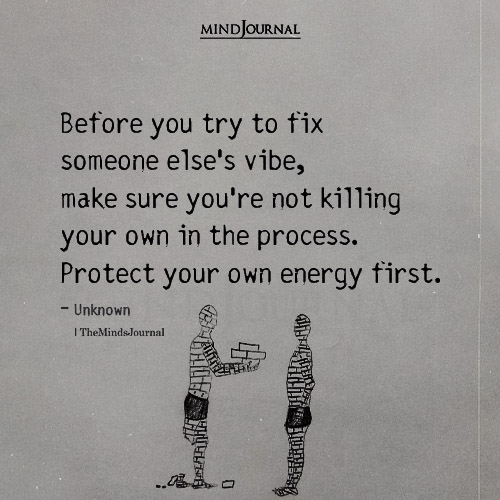Do you find yourself constantly trying to solve every problem your loved ones encounter, often taking on more than your fair share of responsibility? Do you feel compelled to “fix” your partner or the people in your life? Then it’s crucial that you understand what drives this behavior and how fixer mentality affects relationships.
The fact is, this “fixer mentality” can wreak havoc on your relationships if you’re not careful. I have personally seen how this problematic mindset can lead to all sorts of unhealthy dynamics – from emotional codependency to a profound lack of empathy.
So let’s take a look at the psychology of the fixer mentality and explain exactly how it can negatively impact your relationships. By the end, you’ll have a better understanding of this common issue – and hopefully some insights on how to break free of it. Let’s get started.
The Psychology of a Fixer
At its core, the fixer mentality stems from a deep-seated feeling of inadequacy. Those who struggle with this mindset often feel that they aren’t “enough” on their own. They compensate by trying to solve everyone else’s problems, in an attempt to feel more valuable and worthy.
Related: Addicted to Helping: Why We Feel The Need To Fix Others
This fixer mentality is frequently rooted in unhealed childhood traumas. Maybe you grew up with parents who were emotionally unavailable, and you learned to meet your own needs by “fixing” them instead. Or perhaps you witnessed a lot of dysfunction in your family, and now you’re unconsciously trying to recreate that dynamic in your adult relationships.

Regardless of the origin, the psychology of a fixer and their mentality is ultimately driven by a need for control. Fixers believe that if they can just solve everyone else’s problems, they’ll be able to avoid experiencing their own painful emotions. They falsely believe that by “helping” others, they can avoid having to confront their own wounds and insecurities.
How Fixer Mentality Affects Relationships
This fixer mindset can wreak absolute havoc on your relationships. But do you know how? how fixer mentality affects relationships?
Let’s take a closer look at some of the key ways it can damage your connections with others:
1. Emotional Codependency
When you’re in a constant state of “fixing,” it’s easy to become emotionally codependent on the people in your life. You start to define your self-worth based on your ability to solve their problems, rather than valuing yourself for who you are. This can lead to an unhealthy imbalance of power and a profound lack of boundaries.
2. Feeling of Inadequacy
Ironically, the fixer mentality often backfires and reinforces the very feeling of inadequacy that spawned it in the first place. No matter how much you try to “fix” your partner or loved ones, you’ll never be able to control their healing process or “save” them from their own struggles. This can leave you feeling frustrated, drained, and increasingly insecure.
Related: Addicted to Helping: Why We Feel The Need To Fix Others
3. Boundary Violation
Fixers have a tendency to overstep boundaries in their relationships. They may insert themselves into situations that don’t concern them, or try to impose their “solutions” on others without being invited to do so. Boundary violation can make the people in your life feel smothered, disrespected, and resentful.

4. Lack of Empathy
When you’re so focused on “fixing” someone else, it becomes incredibly difficult to truly empathize with their experience. You’re so busy trying to problem-solve that you fail to simply listen, validate, and be present with them. This can leave your loved ones feeling unseen and misunderstood.
5. Control Issues
The fixer mentality is fundamentally rooted in a need for control. Due to their control issues, fixers believe that if they can just find the “right” solution, they can single-handedly control the outcome of a situation. This is an impossible – and exhausting – pursuit that inevitably damages relationships.
Related: The Honest Truth Is I Am Done Trying To Fix You
Breaking Free of the Fixer Mentality
If any of this sounds familiar, don’t worry – you’re not alone. The fixer mentality is an incredibly common issue, and with the right awareness and tools, it’s absolutely possible to break free of it.
The first step is to get honest with yourself about this pattern. When do you find yourself slipping into “fix-it” mode? What emotional needs are you trying to meet by doing this? Shining a light on the root causes can be incredibly powerful.
Next, work on developing more empathy, patience, and trust in your relationships. Instead of trying to control the outcome, focus on truly listening to your partner or loved one. Validate their feelings, ask curious questions, and resist the urge to jump in with “solutions.”

It’s also crucial to address any unhealed childhood traumas that may be fueling your fixer mentality. Consider working with a therapist or coach who can help you process these deeper issues in a healthy way.
Finally, prioritize your own self-care and personal growth. The more you can learn to meet your own emotional needs, the less you’ll feel the compulsive drive to “fix” everyone around you. Invest in activities that help you feel grounded, fulfilled, and at peace within yourself.
Once you know how fixer mentality affects relationships, you can take the necessary steps to change such negative behavior patterns. With time and consistent effort, you can break free of the fixer mentality and start building the healthy, mutually empowering relationships you truly deserve. It won’t be easy, but I promise it will be worth it.
Related: 10 Reasons Why You Should Date A Girl Who Likes to “Fix” People
Frequently Asked Questions (FAQs):
What is the psychology behind being a fixer?
Fixers often seek control, validation, and distraction from personal issues, driven by empathy and a desire to help others.
What is the personality of a fixer?
Fixers are empathetic, responsible, control-seeking, and often derive self-worth from solving others’ problems, sometimes neglecting their own needs.
Is being a fixer a trauma response?
Yes, being a fixer can be a trauma response, where helping others serves as a distraction from their unresolved emotional issues.









Leave a Reply
You must be logged in to post a comment.